17 Aug2020
By Jacqueline Rodriguez

Inclusive leadership is better for schools, teachers, and all students. Every student deserves to attend a school led by a principal with the skills, knowledge, and training to promote equity for all students, including students with disabilities. Yet, general education teachers and school principals report being underprepared to effectively serve students with disabilities. Only 12 percent of a nationally representative sample of school principals and only 17 percent of general education teachers report feeling well prepared to serve and teach students with disabilities.
Support for Preparing Inclusive School Leaders During COVID-19
While the COVID-19 crisis has disrupted education for all students, students with disabilities face unique challenges in transitioning to remote learning and in their eventual transition back to the classroom. Like the pandemic and the systemic racism plaguing our nation, inequitable access to effective school leadership is more prevalent for underserved populations, including students with disabilities. A recently released brief from CCSSO, the CEEDAR Center, and the Center on Great Teachers and Leaders highlights key recommendations, examples, and resources to support educator preparation programs (EPPs) and Deans of Education in addressing the pressing challenges for school leaders posed by the COVID-19 crises.
17 Aug2020
By Barbara McKenna

Learning Policy Institute’s (LPI) new study, Measuring Student Socioeconomic Status: Toward a Comprehensive Approach, discusses the limitations of the popular measure and examines alternatives for state policymakers who are seeking to accurately count students from low-income families.
“Changing how we measure and address student poverty is more important than ever,” said LPI Senior Researcher Peter Cookson, who authored the study. “A shift away from the [federal Free and Reduced-Price Lunch] FRPL [program] measure was already long overdue and taking place in some states. This takes on deeper urgency now as learning for a generation of students has been upheaved by the COVID-19 pandemic. Accurately measuring family incomes is necessary if policymakers are to allocate school resources that meet the educational needs of students.”
14 Aug2020
By Monika Jo

As K-12 student populations continue to diversify, it is essential for educator preparation programs to ensure teacher candidates possess the knowledge, skills, and dispositions to meet the needs of all learners. Mixed reality simulation is an effective tool to facilitate the development of culturally responsive and sustaining educators and to foster self-reflection. Through virtual simulations, instructor and peers provide critical feedback and observation of candidates’ performance via video.
Join AACTE and Mursion for the webinar, “Fostering Critical Self-Reflection: Meeting the Needs of English Language Learners through Mixed Reality Simulation,” at 1:00 p.m. ET, Tuesday, August 18. This session will detail the process used in a STEM methods course to engage candidates in addressing the needs of English language learners and provide examples of how candidate thinking and planning changed as a result. The presenters include:
24 Jul2020
By Aurelia Grayson and Lauren Pescatore
Principals’ leadership is a critical factor in schools’ success, and school leader preparation programs play a key role in facilitating that success. Specific strategies and resources can support the growth of a strong pipeline of principals who are able to lead teaching and learning in today’s schools. AACTE supports the Wallace Foundation’s principal preparation work, which includes research and initiatives such as the Principal Pipeline Initiative and the University Preparation Programs. The following is a an announcement from the Wallace Foundation’s most recent research featuring three reports that examine efforts being taken in large districts across the country to shift the principal supervisor role from a focus on administration to supporting principals as instructional leaders.
The Wallace Foundation released a trio of reports examining the benefits school districts gained from changing the principal supervisor role to focus less on administrative duties and more on supporting principals in improving instruction. Teams of researchers from Vanderbilt University, the University of Utah, Mathematica, and the Council of the Great City Schools collaborated with the foundation to design and administer surveys that show how the supervisor role may be changing in large districts nationwide. The reports build on earlier research suggesting that effective supervision is part of a comprehensive principal pipeline, with aligned parts, that can lead to benefits for student achievement.
17 Jul2020
By Monika Jo
Since AACTE and Mursion launched the Education Roundtable series, we have had the pleasure of showcasing the work of educators, who have integrated teacher training via virtual reality (VR) simulation into their respective programs or are studying the various aspects of this modality.
In an upcoming three-part mini-series, Carrie Straub, executive director of education programs and research at Mursion, will host a team from Harvard Graduate School of Education (HGSE) who have generously offered to share the magic behind their work. They will upack and discuss the following:
- Recruiting and training simulation specialists
- The development of simulations including how participants are oriented into Mursion experiences, models for simulation designs, and post simulation activities aimed at transferring skills
- The development of four simulations developed through the Reach Every Reader grant which HGSE designed to develop teachers as critical thinkers and learners in the classroom alongside their students
10 Jul2020
By Nicole Dunn
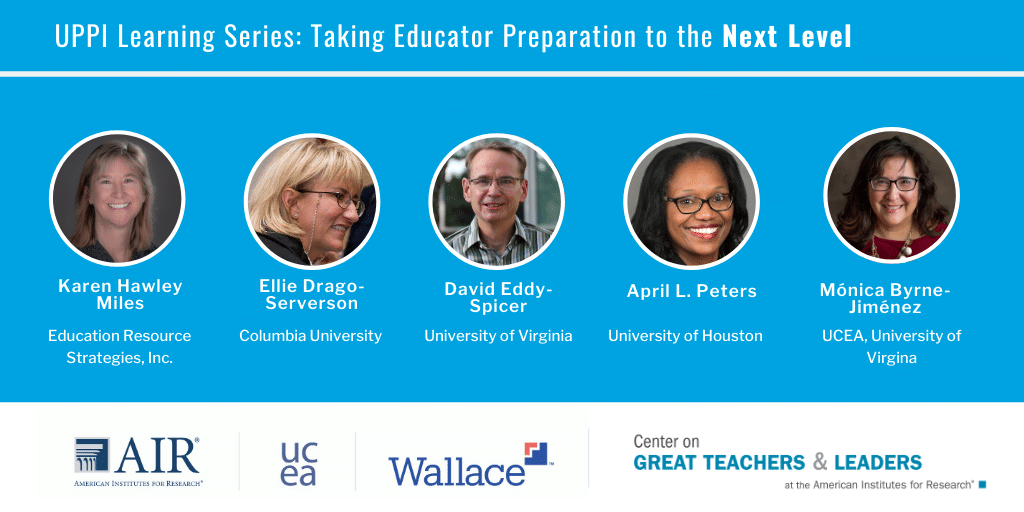
AACTE invites you to join us for the next session of The Wallace Foundation’s second University Principal Preparation Initiative (UPP) Learning Series. Teaming and engaging in meaningful and difficult conversations require teams to not only be open to learning together but also to develop their leadership abilities together. This session is designed to equip teams with tools to strengthen teamwork and engage in conversations that cultivate the leadership capacity of one another.
- Facilitator: Ellie Drago Serverson, professor of education leadership and adult learning and leadership, and director of the PhD Program in Education Leadership, Teachers College, Columbia University
- Thursday, July 16, 2020
- Presentation: 1:00–1:45 p.m. EST
- UPPI member-only discussion: 1:45–2:30 p.m. EST (A separate email will be sent with registration link for this session to all UPPI member registrants.)
- Register for the presentation.
02 Jul2020
By Jacqueline Rodriguez
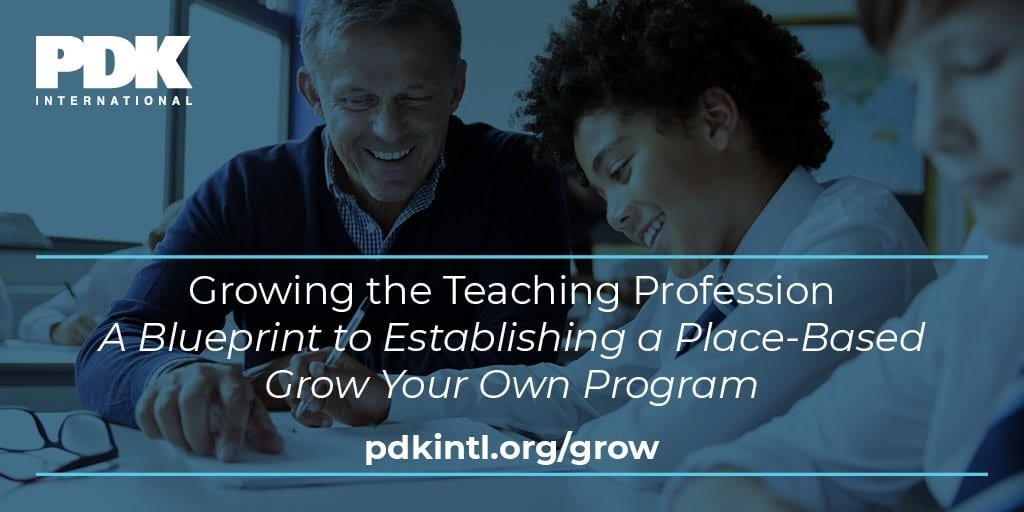
In collaboration with national experts including AACTE, Phi Delta Kappa International (PDK) has released a Blueprint to Establishing a Place-Based Grow Your Own Program to support growth in the teaching profession. According to PDK, “Grow your own programs recruit students from their current high school population to enter educator pathway programs. Districts and states then partner with local educator preparation programs to offer enrollment incentives to students, keeping them close to home so that they will return as teachers to the classrooms where they currently learn.”
As our nation’s schools are increasingly diverse, our teaching workforce must reflect the communities in which they serve. This step-by-step Blueprint provides the context and the guiding principles to support local leaders who seek to grow their own teaching pool from within their diverse eco-system.
01 Jul2020
By Nicole Dunn
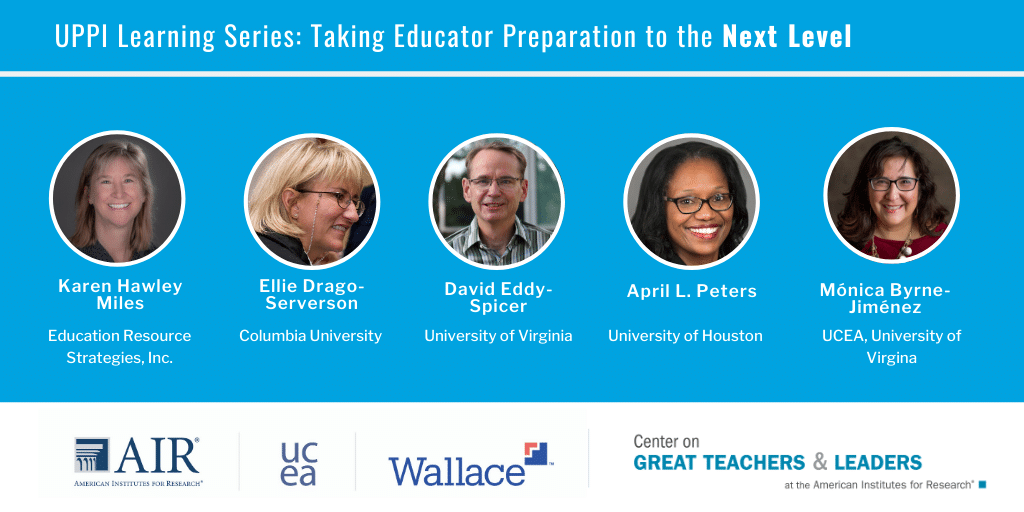
The Wallace Foundation’s University Principal Preparation Initiative (UPPI), which supports universities redesigning their principal preparation programs, has never been more important to students and communities. In addition to creating and sustaining efforts to improve equity and academic achievement for their students, school principals are navigating unprecedented changes to the way teaching and learning occurs.
AACTE invites you to join us as we continue to participate in the national conversation about principal preparation redesign through UPPI’s online learning series, “Taking Education Preparation to the Next Level.”
The five-session series, brought to you by The Wallace Foundation’s UPPI Network, in coordination with the University Council for Educational Administration (UCEA), will provide university/college principal preparation faculty within and beyond the UPPI network some important, collaborative tools and practical ideas on ways to support principal preparation and pipelines. Through the five-part series, national experts provide 45-minute, interactive sessions that address the following questions:
- How can principals lead schools focused on equity and academic improvement now and in the future?
- How can universities engage with partners to develop and sustain principal preparation programs to meet future challenges?
All are invited to attend the 45-minute interactive sessions facilitated by national experts. These sessions, described below, provide ideas and tools to advance leadership preparation, and foster improved collaboration between teacher and principal preparation.
25 Jun2020
By Jacqueline Rodriguez
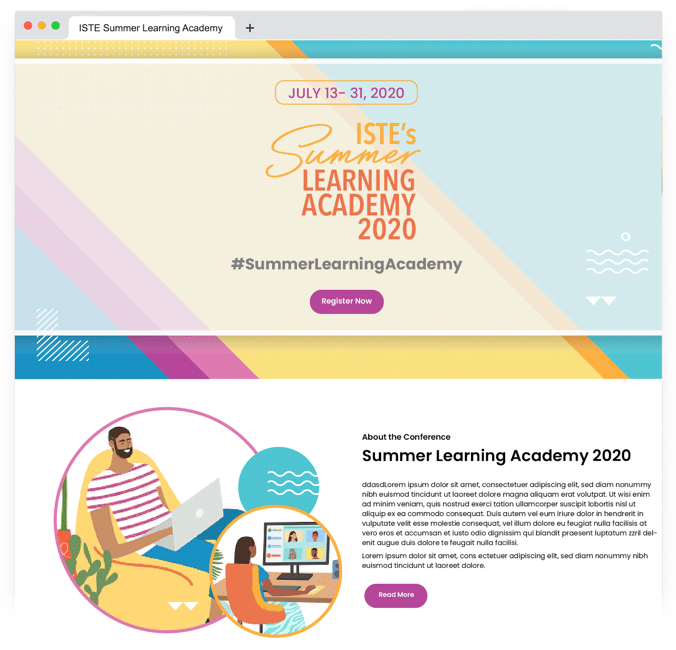 As we look toward fall 2020, it is clear that PK-12 schools will continue to use some blend of online and face-to-face learning as they deal with social distancing requirements and a possible resurge of COVID-19 cases. Teaching effectively with technology is now an essential competency for all educators.
As we look toward fall 2020, it is clear that PK-12 schools will continue to use some blend of online and face-to-face learning as they deal with social distancing requirements and a possible resurge of COVID-19 cases. Teaching effectively with technology is now an essential competency for all educators.
This summer provides a window of opportunity to deepen teacher candidates’ ability to effectively use technology to support learning. But that shift will not happen through checklists or tool training alone. Educators need explicit strategies and peer support. They also need professional learning experiences that will count towards their ongoing career development and continuing education credits.
To address these issues, AACTE is proud to team up with the International Society for Technology in Education (ISTE) to launch a Summer Learning Academy designed to prepare K-12 educators and teacher candidates for teaching in online and blended learning settings this fall.
This fun 3-week summer learning experience will provide the online teaching support educators have been asking for in a flexible format that meets their needs. Educators who successfully complete the program earn continuing education units (CEUs) and graduate-level credit.
22 Jun2020
By Monika Jo
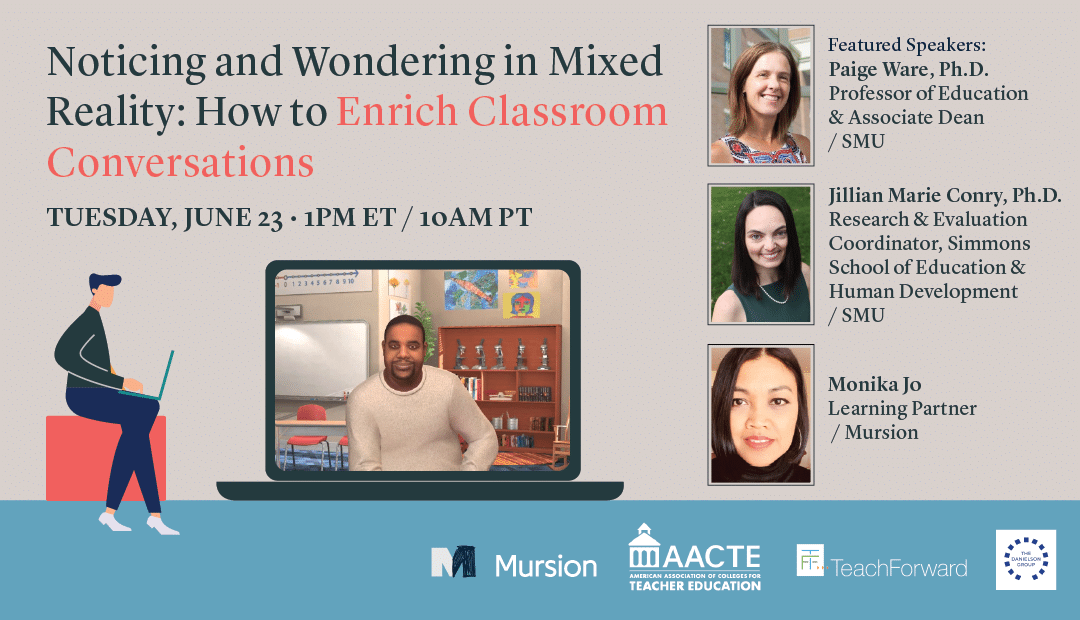
Are you curious to find out more about what it’s like to incorporate Mursion into your program, including how to recruit and train your own simulation specialist? Come hear AACTE member institution Southern Methodist University (SMU) share their experiences as a licensee of the Mursion simulation platform during the Education Roundtable on Tuesday, June 23, at 1:00 p.m. ET. Register to attend (or to receive the link to the recording of the event).
The webinar will feature SMU’s Jillian Conry, research and evaluation coordinator, and Paige Ware, associate dean and professor of education. They will share how Mursion can be used in a number of flexible ways: as a tool for practicing skills and receiving feedback, as a way to evaluate specific teaching competencies, and as a way to create shared experiences that enrich classroom conversations.
22 Jun2020
By Lynn M. Gangone
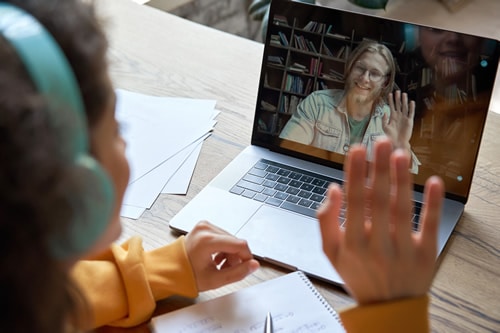
This article originally appeared in eCampus News.
With the onset of coronavirus (COVID-19), school districts, institutions of higher education, and educators are finding themselves in uncharted territory. COVID-19 hit hard and fast. And with that, so did the shift from in-school instruction to online learning, which brought to light very complicated issues and inequities.
The onset of remote learning has magnified the disparity between students who have access to computers and internet and those who do not. The digital divide in our communities, particularly among children from underrepresented and low socioeconomic communities, raises questions that need to be answered.
What technologically based tools make a difference? What context is critical for successful introduction and integration of such tools? What scale of implementation might be possible?
12 Jun2020
By Jacqueline Rodriguez
 Learners of all ages are being impacted by COVID-19 through school closures, the transition to online learning, and the shortage of teachers and faculty across the nation. AACTE continues its long tradition of addressing the educator career continuum and supporting PK-12 learners in America’s public schools by joining the Educating All Learners Alliance (EALA), an alliance dedicated to equity for complex learners.
Learners of all ages are being impacted by COVID-19 through school closures, the transition to online learning, and the shortage of teachers and faculty across the nation. AACTE continues its long tradition of addressing the educator career continuum and supporting PK-12 learners in America’s public schools by joining the Educating All Learners Alliance (EALA), an alliance dedicated to equity for complex learners.
EALA is specifically designed to help ensure the continuity of special education services during remote instruction and to spotlight best practice approaches for schools and educators. It represents a dynamic alliance of non-partisan groups deeply committed to the success of students with disabilities.
09 Jun2020
By Nicole Dunn
As our education system continues to provide online learning in the wake of the pandemic, all learning institutions will need to consider the element of equitable access to technology for their students. In the past, increasing our student’s digital access in online and blended learning environments has been on the shoulders of families as opposed to schools. Now that technology is being leveraged for learning in our school systems, low-and moderate-income (LMI) youth need education leaders to build the capability or partner with institutions that can support computers, broadband, and technological support access.
The National Center on Digital Equity in collaboration with the Federal Deposit Insurance Corporation (FDIC), is hosting a series of webinars titled “Community Reinvestment Act, Digital Equity and Systemic Inclusion.” In this four-part series, the FDIC will walk participants through systemic approaches that advance digital equity in LMI communities in support of financial and economic inclusion. With the immediate shift to online learning within our education system, this series brings our focus to stabilizing LMI youth and their communities.
02 Jun2020
By Monika Jo
According to the 2017 Workplace Learning Report, over 50% of learning professionals say that developing strong leaders is the number one objective for their organization. Coaching, communication, and collaboration top the list of skills for leaders, and large organizations report communication skills are more in demand than technical skills. This applies not only to companies’ employees but also for preparing teachers—who need to be adept at having high stakes conversations with their students, peers, administrators and students’ parents and guardians. Now add to that mix a public health crisis that has forced the issue of training while working from home (WFH).
In this white paper ,“Best in Class Leadership Development: How Virtual Reality and Avatars are Changing the Learning Landscape,” you will learn about modern, remote learning experiences that harness today’s technology to affect real behavior change. Backed by research, and no longer novel, simulations and use of avatars to assist learning is playing an increasingly major role in improving human interactions. Here is an outline of the white paper:
02 Jun2020
AACTE Responds to COVID-19
By Jacqueline Rodriguez
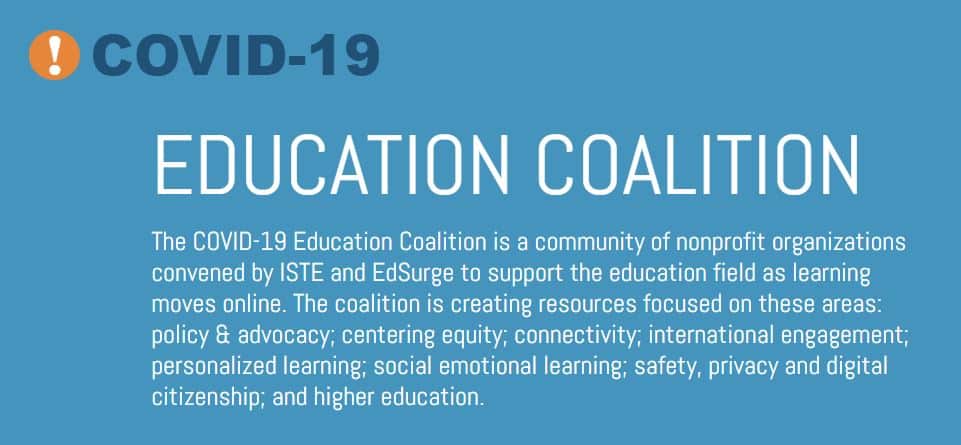 As every educator in the country can attest, effectively leveraging technology in our classrooms, both in the virtual and brick and mortar environment, is paramount. To support our members, earlier this spring AACTE joined more than 70 education organizations in the COVID-19 Education Coalition formed by the International Society of Technology in Education (ISTE). The Coalition’s purpose is curate, create, and deliver high-quality tools and support for educators as they keep the learning going during extended school closures caused by the global pandemic. ISTE and coalition members have launched LearningKeepsGoing.org, a free, online portal with resources for educators and a help desk with experts from across the country to provide real-time support to educators. LearningKeepsGoing.org will also list weekly webinars, offering educators and administrators direct access to national experts.
As every educator in the country can attest, effectively leveraging technology in our classrooms, both in the virtual and brick and mortar environment, is paramount. To support our members, earlier this spring AACTE joined more than 70 education organizations in the COVID-19 Education Coalition formed by the International Society of Technology in Education (ISTE). The Coalition’s purpose is curate, create, and deliver high-quality tools and support for educators as they keep the learning going during extended school closures caused by the global pandemic. ISTE and coalition members have launched LearningKeepsGoing.org, a free, online portal with resources for educators and a help desk with experts from across the country to provide real-time support to educators. LearningKeepsGoing.org will also list weekly webinars, offering educators and administrators direct access to national experts.
As AACTE’s assistant vice president of programs and professional learning, I am co-leading the Higher Education subcommittee of the Coalition with David Sykhuis, assistant dean of the College of Natural and Health Sciences, AACTE Innovation and Technology co-chair, and chair of the National Technology Leadership Summit. Members of the subcommittee include:













 As we look toward fall 2020, it is clear that PK-12 schools will continue to use some blend of online and face-to-face learning as they deal with social distancing requirements and a possible resurge of COVID-19 cases. Teaching effectively with technology is now an essential competency for all educators.
As we look toward fall 2020, it is clear that PK-12 schools will continue to use some blend of online and face-to-face learning as they deal with social distancing requirements and a possible resurge of COVID-19 cases. Teaching effectively with technology is now an essential competency for all educators.

 Learners of all ages are being impacted by COVID-19 through school closures, the transition to online learning, and the shortage of teachers and faculty across the nation. AACTE continues its long tradition of addressing the educator career continuum and supporting PK-12 learners in America’s public schools by joining the
Learners of all ages are being impacted by COVID-19 through school closures, the transition to online learning, and the shortage of teachers and faculty across the nation. AACTE continues its long tradition of addressing the educator career continuum and supporting PK-12 learners in America’s public schools by joining the  As every educator in the country can attest, effectively leveraging technology in our classrooms, both in the virtual and brick and mortar environment, is paramount. To support our members, earlier this spring AACTE joined more than 70 education organizations in the
As every educator in the country can attest, effectively leveraging technology in our classrooms, both in the virtual and brick and mortar environment, is paramount. To support our members, earlier this spring AACTE joined more than 70 education organizations in the